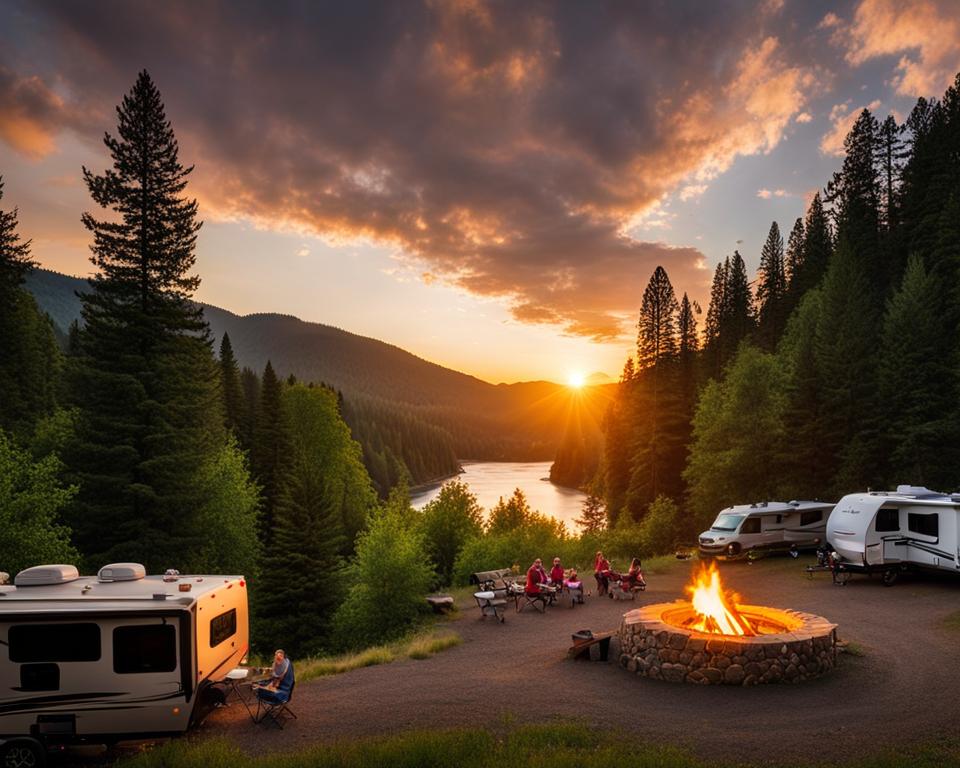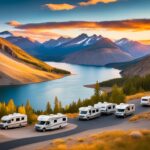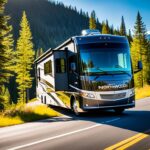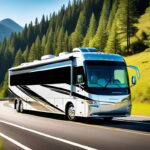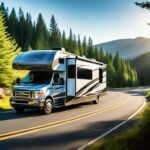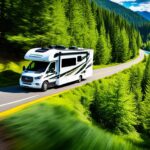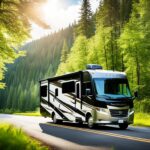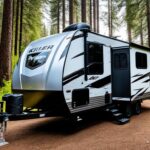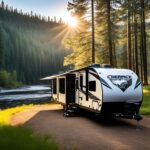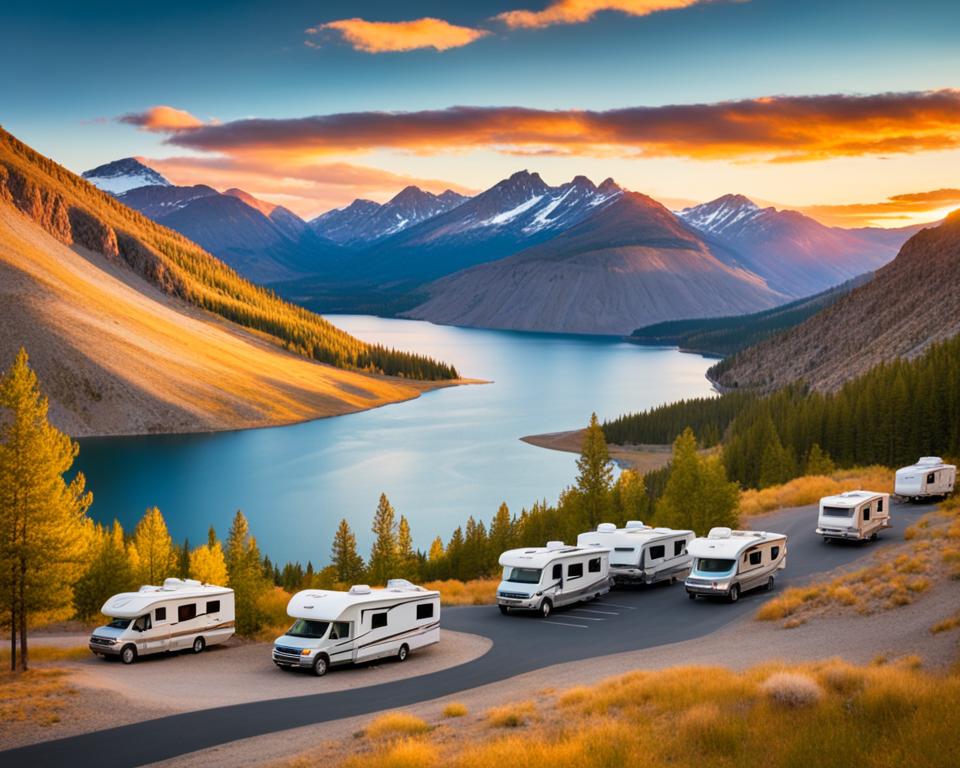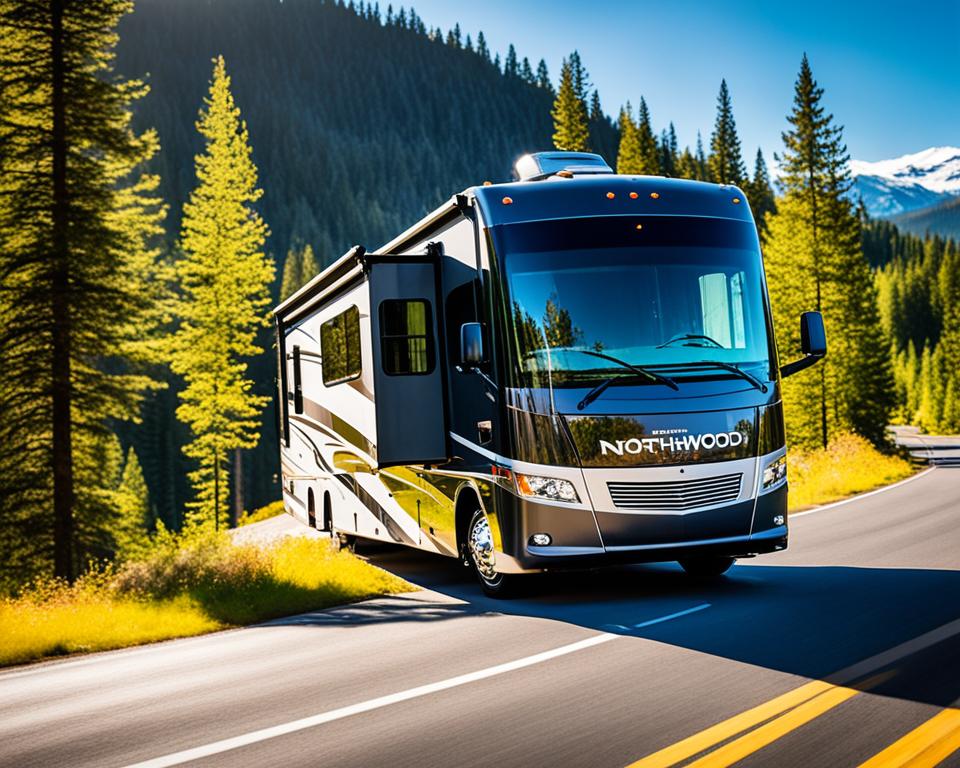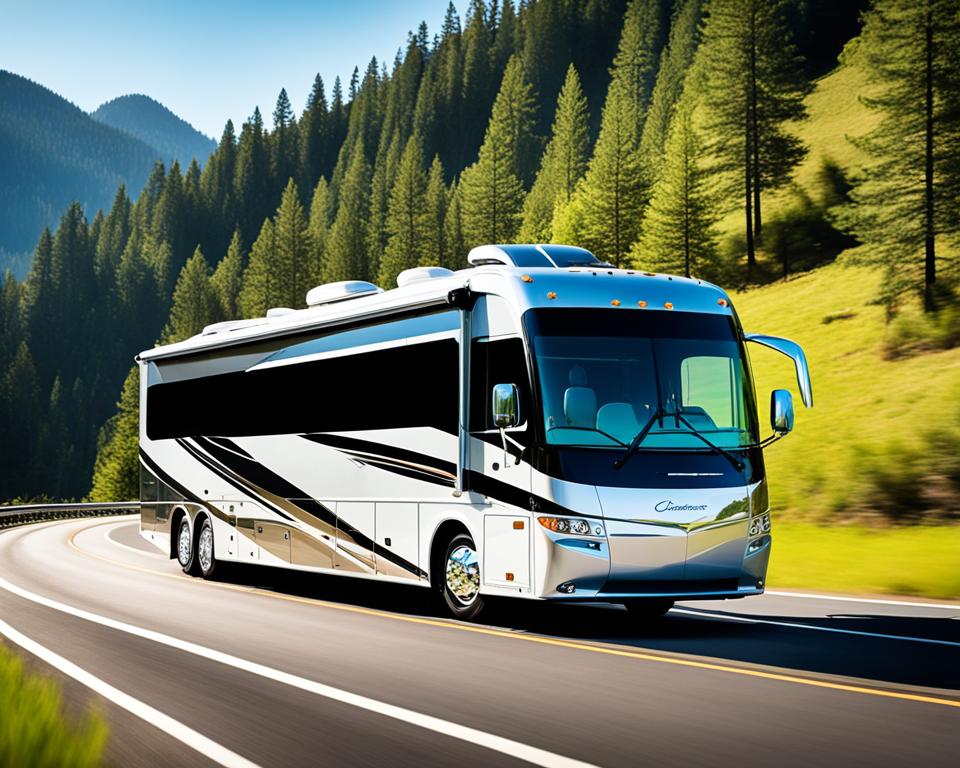Welcome to the ultimate guide to recreational vehicles (RVs)! Whether you’re a seasoned RV enthusiast or a beginner looking to embark on your first adventure, this comprehensive guide will provide you with all the tips and information you need to make the most of your RV experience.
RVs come in many forms, including motorhomes, camper vans, travel trailers, and fifth wheels. They offer a unique way to travel and explore the country, allowing you to bring the comforts of home wherever you go. From RV camping in breathtaking national parks to RV rentals for a weekend getaway, there are endless possibilities for RV enthusiasts.
In this guide, we will cover various aspects of RV living, including budgeting, selecting the right RV for your needs, preparing for your trip, safe driving practices, setting up camp, RV maintenance, and more. Whether you’re planning a full-time RV lifestyle or just looking for a fun and convenient way to travel, this guide has got you covered.
So, buckle up and get ready to embark on the journey of a lifetime. Let’s dive into the world of RVs and discover the freedom and adventures they offer.
Key Takeaways:
- Recreational vehicles (RVs) offer a unique way to travel and explore the country, bringing the comforts of home on the road.
- There are various types of RVs, including motorhomes, camper vans, travel trailers, and fifth wheels, catering to different travel preferences and needs.
- This comprehensive guide will cover budgeting, selecting the right RV, trip preparation, safe driving practices, setting up camp, RV maintenance, and more.
- RV living can provide a full-time lifestyle or be a fun way to enjoy vacations and weekend getaways.
- Get ready for the adventure of a lifetime as we dive into the world of RVs and explore the freedom and excitement they bring.
Full-Time RV Living: Cost Considerations
When it comes to full-time RV living, understanding the cost considerations is essential for anyone considering this lifestyle. The expenses associated with RV living can vary greatly depending on various factors. Let’s explore the key costs involved in RV living and how they can impact your budget.
Purchasing an RV
The first major expense to consider is the purchase of an RV itself. The cost of an RV can range from a few thousand dollars for a used model to several hundred thousand dollars for a brand new, high-end motorhome. The type and size of RV you choose will heavily influence the price tag.
RV Park Fees
Another significant cost to take into account is the fees associated with staying at RV parks. These fees can vary depending on factors such as location, amenities, and the length of your stay. Monthly rates at RV parks can range from around $400 to $1,500 or more, depending on the park’s popularity and location.
Utilities and Maintenance
Just like a traditional home, RV living comes with utility expenses. These can include electricity, water, propane, and sewer fees. Additionally, regular RV maintenance is crucial to keep your vehicle in good condition and prevent costly repairs down the road.
Insurance and Roadside Assistance
Insuring your RV is essential to protect your investment and provide coverage in case of accidents or damages. The cost of insurance can vary depending on factors such as the type of RV, its value, your driving record, and the coverage options you choose.
Furthermore, having a roadside assistance plan is highly recommended for full-time RVers. This ensures that help is just a phone call away in case of breakdowns, flat tires, or other unexpected incidents on the road.
Fuel and Activities
Traveling in an RV involves fuel expenses, especially if you plan on exploring different destinations frequently. Although fuel costs fluctuate, it’s an important aspect to consider in your budgeting. Additionally, engaging in various activities and attractions while on the road can also add to your overall expenses.
Groceries, Eating Out, and Internet Data Plan
“RV living allows you the freedom to cook your meals on board and enjoy home-cooked meals whenever you please, reducing restaurant expenses.”
While RV living allows you the freedom to cook your meals on board and enjoy home-cooked meals whenever you please, it’s important to consider the costs of groceries and kitchen supplies. Eating out occasionally can also be a delightful part of the RV lifestyle, but it’s another expense to keep in mind.
Moreover, staying connected on the road is crucial for many full-time RVers. Researching internet data plans that suit your needs is essential, whether you require internet access for work, entertainment, or staying in touch with loved ones.
Entertainment, Cell Phone, and Other Expenses
“Subscription entertainment services like Netflix or Hulu are popular among full-time RVers for enjoying movie nights and binge-watching their favorite shows.”
Entertainment expenses, including subscription services like Netflix or Hulu, are popular among full-time RVers for enjoying movie nights and binge-watching their favorite shows. Additionally, cell phone plans and other expenses like propane, water, sewer, and mail forwarding services are additional considerations for your budget.
By considering these key factors, you can create a comprehensive budget for your full-time RV living experience. It’s important to note that individual expenses can vary based on personal preferences, travel style, and the specific RV lifestyle you choose to adopt.
| Expense | Estimated Cost Range (Monthly) |
|---|---|
| Purchasing an RV | $X,XXX – $XX,XXX |
| RV Park Fees | $XXX – $XXXX |
| Utilities and Maintenance | $XXX – $XXX |
| Insurance and Roadside Assistance | $XXX – $XXX |
| Fuel and Activities | $XXX – $XXX |
| Groceries, Eating Out, and Internet Data Plan | $XXX – $XXX |
| Entertainment, Cell Phone, and Other Expenses | $XXX – $XXX |
RV Living and Debt
Contrary to popular belief, you don’t have to be debt-free to start RV living. Many people dream of living in an RV and exploring the open road but worry about the financial implications. The truth is, with proper planning and budgeting, it is possible to live the RV lifestyle even with debt.
Creating a solid budget is the key to managing your finances while living in an RV. Start by assessing your current debt situation and creating a plan to pay it off over time. Set realistic goals and prioritize your debt payments based on interest rates and balances.
Knowing your travel style is crucial when budgeting for the RV lifestyle. Are you planning on full-time RV living or using your RV for occasional trips? Understanding how often you will be on the road and the associated costs can help you plan your budget effectively.
Many RVers find creative ways to earn money while living on the road. Working remotely has become increasingly popular, with more companies offering remote work options. This allows you to earn a steady income while enjoying the freedom and flexibility of RV living.
Additionally, there are various opportunities for seasonal work in popular RV destinations such as national parks and campgrounds. These temporary jobs can provide you with additional income and unique experiences along your journey.
Managing your finances while living in an RV requires discipline and careful planning. Stick to your budget, prioritize debt repayment, and explore creative ways to earn income on the road. With the right mindset and financial strategy, you can embark on an RV adventure without letting debt hold you back.
Choosing the Right RV
When it comes to selecting the perfect RV for your adventures, several factors should be considered. Your budget, travel style, and the number of people traveling with you all play a role in determining the most suitable option. Whether you’re looking for convenience, flexibility, or a combination of both, there are various types of RVs to choose from.
One popular choice is the motorhome. Motorhomes are fully self-contained and provide both transportation and living space in one vehicle. They offer convenience and are easy to set up and pack up, making them ideal for those who value flexibility and enjoy spontaneous road trips.
If you prefer a separate towing vehicle, a travel trailer might be the right choice for you. Travel trailers come in a range of sizes and styles, allowing you to find one that suits your needs. They offer the flexibility to detach the trailer from the towing vehicle, allowing you to explore the area without bringing your entire living space with you.
For those who need more living space and storage, fifth wheels are an excellent option. Fifth wheels are towable RVs that connect to a hitch in the bed of a pickup truck. The unique design offers increased stability on the road and often includes additional levels and slide-outs, providing ample room for larger families or those who enjoy extended trips.
If you’re looking for a more affordable and compact option, consider a pop-up camper. Pop-up campers are lightweight and can be easily towed by smaller vehicles. They provide basic amenities and are an ideal choice for those who enjoy camping in nature while maintaining some level of comfort.
Comparison of RV Types:
| RV Type | Pros | Cons |
|---|---|---|
| Motorhome | Convenience of having transportation and living space combined | Higher upfront cost and maintenance expenses |
| Travel Trailer | Flexibility to leave the living space behind when exploring | Requires a separate towing vehicle |
| Fifth Wheel | Spacious and provides additional levels and slide-outs | Requires a pickup truck with a hitch for towing |
| Pop-up Camper | Affordable and compact option | Basic amenities and limited living space |
Choosing the right RV is an important decision that will greatly impact your travel experience. Take the time to assess your needs and preferences before making a choice. Consider test-driving different RVs or seeking advice from experienced RVers to ensure you make the best decision for your adventures. Happy travels!
Preparing for Your RV Trip
Before embarking on your RV adventure, it’s essential to ensure that your vehicle is in good condition and that you have all the necessary supplies. Proper RV trip preparation will help you have a smooth and enjoyable journey.
1. RV Maintenance
Before hitting the open road, take the time to inspect your RV thoroughly. Check the tires for wear and proper inflation, as well as the brakes and mechanical components. This will help prevent any unexpected issues during your trip.
2. Stocking Up on Supplies
To make your RV trip comfortable and convenient, it’s essential to stock up on all the necessary supplies. This includes food, water, toiletries, bedding, cooking utensils, and any other items you may need during your journey. Creating a checklist can help ensure that you don’t forget anything.
3. RV Checklist
An RV checklist is a handy tool to ensure that you have all the essential items and tasks covered before hitting the road. It helps you stay organized and minimizes the chances of forgetting something important. Below is a sample RV checklist to get you started:
| Category | Items |
|---|---|
| General | – Valid driver’s license – RV registration and insurance documents – First aid kit – Emergency contact numbers – Roadside assistance information |
| RV Essentials | – Freshwater hose – Sewer hose and connectors – Leveling blocks – Wheel chocks – RV leveling system – RV repair tools – Generator and fuel |
| Interior | – Bedding and pillows – Kitchen essentials – Toiletries – Cleaning supplies – Trash bags – Non-perishable food items |
| Exterior | – Awning repair kit – Outdoor chairs and table – Grill – Trash containers – Outdoor games or activities |
| Entertainment | – Books, magazines, or e-readers – Board games – DVD player and movies – Outdoor equipment (bikes, kayaks) – Portable grill or campfire supplies |
Remember, this is just a sample checklist. Customize it based on your needs and preferences.
In conclusion, proper RV trip preparation involves inspecting your vehicle, stocking up on supplies, and creating a comprehensive checklist. By taking these steps, you’ll be well-prepared for an enjoyable and stress-free RV journey.
Driving Your RV
Driving an RV can be an exhilarating experience, but it’s essential to prioritize safety and be mindful of the unique challenges that come with maneuvering a larger vehicle. Whether you’re a first-time RVer or looking to brush up on your skills, these RV driving tips will help you navigate the open road with confidence.
Practice Makes Perfect
Before embarking on your road trip, take the time to practice driving and maneuvering your RV in a controlled environment. Find an empty parking lot or an open space where you can get familiar with how your RV handles. Practice turns, parking, and backing up, paying attention to the size and dimensions of your vehicle.
Know Your RV’s Height and Weight
One crucial aspect of RV driving safety is being aware of the height and weight of your vehicle. RVs can be taller and heavier than standard vehicles, which means you may need to take precautions when approaching bridges, tunnels, or low-hanging branches. Plan your route accordingly and use caution when navigating areas with height restrictions.
Take Turns Slowly
When turning with your RV, it’s important to take it slow and allow for extra space. RVs have a larger turning radius compared to cars, so give yourself plenty of room to make turns safely. Turn wider than you think you need to and be mindful of curbs, obstacles, and other vehicles.
Leave Space and Maintain a Safe Distance
Another crucial RV driving tip is to leave plenty of space between your RV and other vehicles on the road. RVs require a longer stopping distance, so it’s important to maintain a safe following distance to avoid rear-end collisions. Anticipate the actions of other drivers and be prepared to react accordingly.
“Remember, driving an RV is different from driving a regular car. It’s important to adapt your driving style and be aware of the size and weight of your vehicle. Take it slow, be cautious, and you’ll have a safe and enjoyable journey.” – RV enthusiast
Summary
Driving your RV doesn’t have to be intimidating. By practicing, being mindful of the height and weight of your vehicle, taking turns slowly, and maintaining a safe distance from other vehicles, you can confidently navigate the roads and enjoy your RV adventures.
Setting Up Camp
Once you’ve arrived at your campsite, it’s time to set up camp and make yourself at home. Follow these steps to ensure a smooth and comfortable camping experience.
Leveling the RV
Before you can settle in, it’s essential to level your RV to avoid any discomfort and potential damage. Use leveling blocks or jacks to achieve a stable and even surface. This will help with the proper functioning of your appliances, the overall stability of the RV, and ensure a good night’s sleep.
RV Hookups
Next, take care of the RV hookups to ensure access to essential utilities. Connect your RV to the water, sewer, and electric connections provided at the campsite. These hookups will allow you to have running water, dispose of waste, and power your appliances without any hassle.
Setting Up Your Outdoor Space
Make the most of your campsite by setting up your outdoor space. Consider creating a cozy seating area with camping chairs, a table, and an awning, if available. This will be a welcoming spot to relax, eat, and socialize while enjoying the great outdoors.
Familiarize Yourself with Campsite Amenities
Take a moment to explore and familiarize yourself with the amenities offered at the campsite. This may include facilities such as showers, restrooms, laundry areas, playgrounds, swimming pools, hiking trails, or picnic areas. Knowing what’s available will help you plan your activities and make the most of your stay.
Setting up camp properly is crucial for a comfortable and enjoyable camping experience. Leveling your RV, hooking up utilities, creating a welcoming outdoor space, and familiarizing yourself with the campsite amenities will ensure that you have everything you need to relax and unwind during your adventures.
Maintaining Your RV
Regular maintenance is crucial to ensure your RV remains in optimal condition for all your adventures. By implementing a routine maintenance schedule and attending to necessary tasks promptly, you can extend the lifespan of your RV and minimize the risk of costly repairs. This section provides essential tips for RV maintenance, including cleaning, inspections, and tire care.
Cleaning Your RV
Keeping your RV clean not only enhances its appearance but also helps prevent damage caused by dirt, dust, and grime. Regularly wash the exterior of your RV using gentle cleaning products designed specifically for RVs. Pay attention to the roof, as it is often overlooked but susceptible to debris and potential leaks. Additionally, clean the interior of your RV regularly, focusing on areas prone to spills, stains, and odors. Maintaining cleanliness contributes to your overall comfort and enjoyment of the RV lifestyle.
Inspecting for Wear and Tear
Regular inspections allow you to identify and address any issues before they become major problems. Conduct thorough visual inspections of both the interior and exterior of your RV. Check for signs of water damage, leaks, cracks, or wear on the roof, windows, doors, and walls. Examine the plumbing system, including pipes, faucets, and valves, for any leaks or signs of deterioration. Inspect the electrical system, including outlets, switches, and wiring, ensuring they are functioning properly and safely. It is also important to inspect the propane system, appliances, and other essential components of your RV.
Tire Care
Your RV’s tires are critical for a safe and smooth journey. Regular tire care is essential to prevent blowouts and ensure optimal performance. Monitor the tire pressure regularly, including the spare tire. Underinflated tires can result in reduced fuel efficiency and increase the risk of tire failure. Follow the manufacturer’s recommendations regarding tire pressure levels for your specific RV model. Additionally, inspect the tires for any signs of wear, such as cracks, bulges, or uneven tread wear. Replace damaged tires promptly to maintain safety on the road. It is also advisable to rotate your RV tires to ensure even wear and extend their lifespan.
| Maintenance Task | Frequency |
|---|---|
| Cleaning the exterior and interior | Regularly, at least every 3 months |
| Inspecting for water damage, leaks, and structural issues | Twice a year |
| Inspecting the plumbing and electrical systems | Twice a year |
| Inspecting the propane system and appliances | Twice a year |
| Checking tire pressure and tread wear | Before every trip |
| Rotating tires | Every 6,000 to 8,000 miles or as recommended by the tire manufacturer |
By integrating these maintenance tasks into your RV care routine, you can ensure a safe and enjoyable travel experience. Regular cleaning, inspections, and tire care are essential for the longevity of your RV. Don’t overlook these important tasks, as they can save you time, money, and potential headaches down the road.
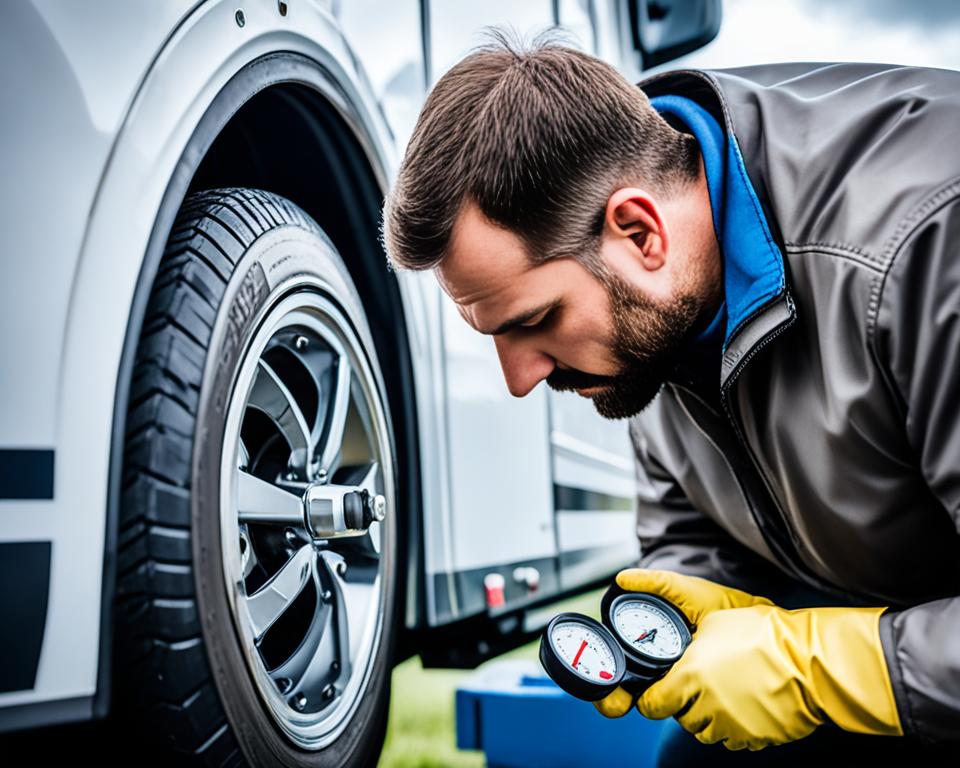
Staying Safe on the Road
In order to ensure a safe and secure RV journey, it’s important to prioritize road safety, RV security, and emergency preparedness. By following these guidelines, you can minimize risks and enjoy a worry-free travel experience.
Observe Traffic Laws and Speed Limits
Always obey traffic laws and adhere to posted speed limits while driving your RV. By doing so, you not only avoid costly fines and penalties but also reduce the likelihood of accidents. Remember, safety should always be your top priority on the road.
Avoid Distractions
Eliminate distractions while driving your RV to maintain focus and concentration. Avoid using mobile devices, eating, or engaging in any other activities that may divert your attention from the road. By keeping your focus on driving, you can react quickly to any potential hazards or emergencies that may arise.
Keep Your RV Secure
RV security is of utmost importance to protect your belongings and ensure your peace of mind. Take the following measures to enhance the security of your RV:
- Always lock your doors and windows when you leave your RV, even if you’re just stepping away for a short period of time.
- Consider installing security devices such as door alarms, window sensors, and motion-activated lights to deter potential intruders.
- Store valuable items out of sight and avoid displaying expensive equipment or electronics that may attract unwanted attention.
- When parking overnight, choose well-lit and secure locations such as designated RV parks or campgrounds.
Be Prepared for Emergencies
RV emergency preparedness is crucial to handle unexpected situations on the road. Make sure you have the following items readily available:
- A well-stocked first-aid kit to address minor injuries and medical emergencies.
- Essential supplies such as flashlights, extra batteries, a fire extinguisher, and a multipurpose tool.
- Emergency contact numbers, including those for roadside assistance services and local authorities.
- Knowledge of basic RV maintenance and troubleshooting to address minor mechanical issues.
By being proactive and prepared, you can effectively respond to emergencies and ensure the safety of yourself and your fellow RV travelers.
Remember, RV road safety, RV security, and RV emergency preparedness are essential components of a successful and enjoyable RV journey. By following these guidelines, you can have a worry-free and memorable adventure on the open road.
Where to Buy or Rent an RV
If you’re considering embarking on an RV adventure, you have two options: purchasing an RV or renting one. Both options offer unique benefits and can cater to different needs. In this section, we’ll explore where you can buy or rent an RV, providing you with resources and platforms to make an informed decision.
RV Dealerships
RV dealerships are a great place to start your search if you’re interested in purchasing an RV. They offer a wide selection of new and used RVs, allowing you to explore different models, sizes, and features. Local dealerships can provide expert advice and assistance in choosing the right RV that suits your lifestyle and budget.
Rental Companies
If you want to test the waters before committing to an RV purchase, renting an RV is an excellent option. Rental companies cater to both beginners and experienced RVers, offering a variety of RV types and sizes to choose from. This allows you to experience the RV lifestyle firsthand and determine which model best fits your needs.
Online Platforms
In addition to dealerships and rental companies, there are online platforms that connect RV owners with potential renters. Platforms like Outdoorsy provide a marketplace for private RV owners to list their vehicles for rent. This offers a wider range of options and the opportunity to rent directly from owners who may offer unique experiences and personal touches.
“Consider renting an RV before purchasing to try different models.”
Image source:
Planning Your First RV Outing
Before embarking on your first RV trip, there are a few essential steps to take to ensure a smooth and enjoyable experience. From stocking up your RV to researching campgrounds and making reservations, careful planning is key. Follow these tips to make the most of your first RV adventure.
Stock Up Your RV
One of the first things you should do before heading out on your RV trip is to stock up your vehicle with all the necessary supplies. Make a checklist of items such as kitchen essentials, bedding, toiletries, and recreational gear. Don’t forget to pack tools and spare parts for any potential RV repairs that may arise during your journey.
Practice Setting Up Camp
Setting up camp can be a new experience for RV beginners. To avoid any confusion or mishaps on your trip, it’s recommended to practice setting up camp before you hit the road. Familiarize yourself with leveling your RV, hooking up utilities, and other necessary tasks. This will help you save time and prevent frustration when you arrive at your chosen campground.
Research Campgrounds and Make Reservations
It’s essential to research and identify the RV camping destinations that align with your travel preferences. There are plenty of options available, ranging from national parks and state parks to private campgrounds and RV resorts. Look for campgrounds that offer the amenities and activities you’re interested in. Once you’ve decided on your destinations, make reservations well in advance. Popular campgrounds often fill up quickly, especially during peak seasons, so securing your spot early is important to avoid disappointment.
Allow Extra Time for Setup and Exploring
When planning your first RV outing, it’s crucial to allocate extra time for both setting up your campsite and exploring the surrounding area. Keep in mind that setting up your RV can take longer than you expect, especially if it’s your first time. Additionally, factor in time to explore the attractions and activities available near your campground. RV trips are not just about camping in one place; they are an opportunity to discover new destinations and make lasting memories.
By taking the time to stock up your RV, practice setting up camp, research campgrounds, make reservations in advance, and allow extra time for setup and exploration, you’ll be well-prepared for your first RV trip. Enjoy the freedom and adventure that RV camping has to offer!
Conclusion
Embarking on an RV adventure can be an exciting and enriching experience, especially for beginners. By following the essential tips outlined in this RV beginner’s guide, you can ensure a successful journey and make the most out of your RV trip.
First and foremost, it’s crucial to choose the right RV that suits your needs and travel style. Whether you opt for a motorhome, travel trailer, fifth wheel, or pop-up camper, consider factors such as budget and the number of people traveling with you.
To ensure a smooth trip, thorough preparation is essential. Make sure to prepare your RV by conducting necessary maintenance and stocking up on supplies. Familiarize yourself with driving an RV and practice maneuvering it beforehand. When setting up camp, level your vehicle properly and connect to the necessary utilities.
Remember to prioritize RV maintenance to keep your vehicle in optimal condition. Regular cleaning, inspections, tire care, and addressing any issues promptly are vital aspects of RV ownership. Additionally, prioritize safety on the road by observing traffic laws, securing your RV, and being prepared for emergencies.
By following these RV tips for beginners, you can embark on an unforgettable RV journey and enjoy all the benefits that RV living has to offer. From the joy of exploring new destinations to the freedom of life on the open road, RVing can truly be a rewarding experience that creates lasting memories. So, embrace the adventure and get ready for an incredible RV trip of a lifetime!
FAQ
What are the costs associated with full-time RV living?
The cost of living in an RV can vary depending on factors such as travel style, frequency of stays at RV parks, and boondocking. Key costs include purchasing the RV itself, park fees, utilities, maintenance, insurance, roadside assistance, fuel, activities, RV memberships, groceries, eating out, internet data plan, laundry, subscription entertainment, cell phone, propane, water, sewer, and mail forwarding service.
Do I need to be debt-free to start RV living?
Contrary to popular belief, you don’t have to be debt-free to start RV living. Creating a budget and knowing your travel style are crucial. Many RVers work remotely or find opportunities to make money on the road.
How do I choose the right RV for my needs?
When choosing an RV, consider factors like budget, travel style, and the number of people traveling with you. Motorhomes offer convenience, while travel trailers offer flexibility. There are also options like fifth wheels and pop-up campers.
What should I do to prepare for my RV trip?
Before your trip, inspect your RV, stock up on essentials, and create a checklist to ensure you have everything you need. Practice driving and maneuvering your RV and be aware of its height and weight. Leave plenty of space between your RV and other vehicles.
How do I set up camp with my RV?
When setting up camp, level your RV using leveling blocks or jacks. Hook up to water, sewer, and electric connections. Set up your outdoor space and familiarize yourself with the campsite amenities.
How do I maintain my RV?
Regular maintenance is necessary to keep your RV in good condition. Clean it regularly and inspect for wear and tear. Change oil and filters, keep tires inflated, and address any issues promptly.
How can I stay safe on the road with my RV?
Observe traffic laws and speed limits, avoid distractions while driving, and keep your RV secure. Be prepared for emergencies with a first-aid kit and essential supplies.
Where can I buy or rent an RV?
You can find local dealers and rental companies listed on GoRVing.com. Consider renting an RV before purchasing to try different models. RVs can also be rented from private owners through platforms like Outdoorsy.
How should I plan my first RV outing?
Stock up your RV, practice setting up camp, and plan your first outing. Research campgrounds, make reservations in advance, and allow extra time for setup and exploring the area.
How can I have a successful RV trip as a beginner?
Follow these tips for RV beginners: Choose the right RV, prepare for your trip, practice safe driving, set up camp properly, maintain your RV, and stay safe on the road. Enjoy the benefits of RVing!

